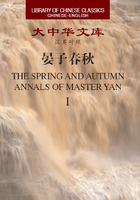
1.7 [7] 景公燕赏无功而罪有司晏子谏
齐景公设宴赏赐无功之人而惩罚不服从命令的官吏,晏子进谏
【原文】
景公燕赏于国内,万钟者三,千钟者五,令三出,而职计(莫)〔筴〕之(从)。公怒,令免职计,令三出,而士师(莫)〔筴〕之(从)。公不说。晏子见,公谓晏子曰:“寡人闻君国者,爱人则能利之,恶人则能疏之。今寡人爱人不能利,恶人不能疏,失君道矣。”晏子曰:“婴闻之,君正臣从谓之顺,君僻臣从谓之逆。今君赏馋谀之(民)〔臣〕,而令吏必从,则是使君失其道,臣失其守也。先王之立爱,以劝善也;其(立)〔去〕恶,以禁暴也。昔者三代之兴也,利于国者爱之,害于国者恶之,故明所爱而贤良众,明所恶而邪僻灭,是以天下治平,百姓和集。及其衰也,行安简易,身安逸乐,顺于己者爱之,逆于己者恶之,故明所爱而邪僻繁,明所恶而贤良灭,离散百姓,危覆社稷。君上不度圣王之兴,而下不观惰君之衰,臣惧君之逆政之行,有司不敢争,以覆社稷,危宗庙。”公曰:“寡人不知也,请从士师之策。”国内之禄,所收者三也。
【今译】
1.7 [7] DURING A BANQUET,DUKE JING REWARDED THOSE LACKING IN M ER IT AND PUNISHED AN OFFICE-HOLDER. YANZI REMONSTRATED.
On the occasion of an awards banquet in the capital,Duke Jing sought to reward three men w ith ten thousand zhong of grain each,and five other men w ith a thousand zhong of grain each. The order was issued three times,but the treasurer did not comply w ith it. The Duke became furious and ordered the treasurer’s dismissal. The orders were repeated three times,but the Chief Judge did not comply w ith the order.
The Duke was displeased,and when Yanzi appeared for an audience,the Duke said to him: “I have heard that he who rules the state has the capacity to grant benefits to those he favors and to alienate those he disfavors. Now,however,I find myself unable to confer benefits upon those I favor and alienate those I disfavor. This means that I have failed w ith respect to the way of the ruler.”
Yanzi responded: “I have heard that if the ruler is correct and the ministers follow suit that is called obedience. If the ruler is aberrant and the ministers follow suit,that is called defiance. But now,if you,my Lord,reward slanderous and flattering m inisters and compel your officials to obey; this is what makes you fail w ith respect to the way of the ruler,and this is what makes m inisters fail in maintaining their official responsibilities. The former kings appointed those whom they cherished,in order to encourage excellence,and they removed those whom they did not favor,as preventive measures against political violence. Formerly,when the Three Dynasties prospered,[1] those who were beneficial to the state were cherished and those who were harm ful were despised. Therefore,the kings made it clear whom they cherished and so the worthy and the good grew in number. They made it clear whom they despised,so the depraved and the deviant were exterminated. Hence,the world was well governed and the people lived in harmony w ith one another. But when the time came that the Three Dynasties declined,the rulers fell into frivolity and slacking and into indulgence and amusements in their private lives. Those who obeyed them were cherished,but those who disobeyed them were despised. As a result,they made clear what they cherished,and thus the depraved and the devious flourished. They made it clear what they despised,and thus the worthy and the good were exterminated. They drove the people apart and scattered them,and the altars of soils and grain were endangered and destroyed. You,my Lord,did not give thought to the prosperity of the sage-kings,on the one hand,and,on the other,you did not pay heed to the decline of the negligent rulers. I am afraid,my Lord,that in light of your practice of perverse policies,those in office do not presum e to contest your policies,and therefore the altars of soil and grain w ill be destroyed and your ancestral shrine w ill be endangered.”
The Duke said: “I was unw ise. I would like to follow the instructions of the Chief Judge.”[2]
注释
[1]The ancient Three Dynasties: Xia 夏 2205–1766 BCE,Shang 商 or Yin 殷 1766–1123 BCE and Zhou 周 1122–249 BCE.
[2]Om it 国内之禄,所收者三也 (JS,29/12).